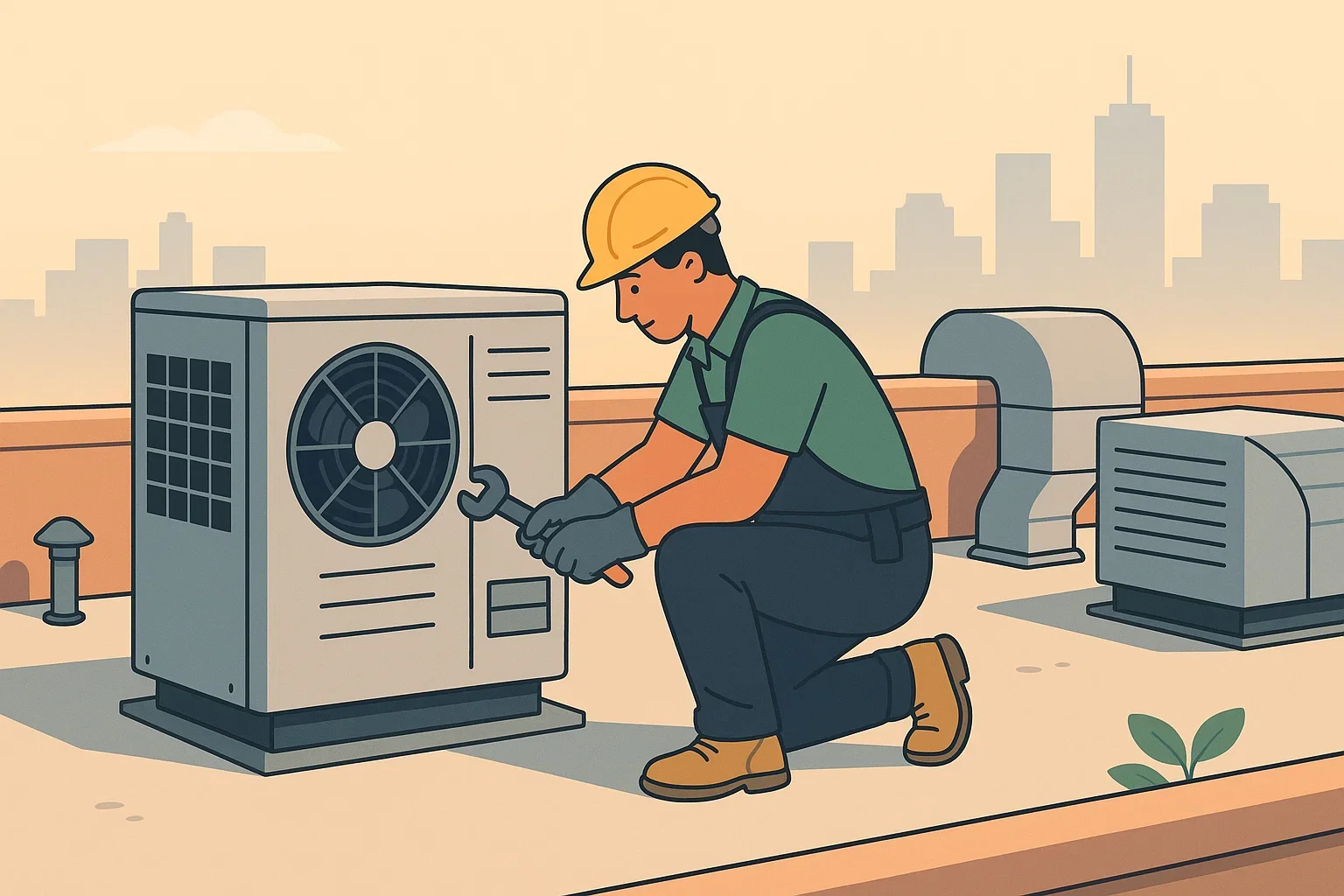Why Edmond Businesses Trust Licensed HVAC Contractors for Compliance
The Compliance Challenge for Commercial HVAC
Commercial HVAC systems are complex, expensive, and essential for tenant comfort and productivity. In Edmond’s hot summers and chilly winters, a malfunctioning system disrupts operations and risks violating building codes. Recent changes to federal energy‑efficiency standards and refrigerant regulations mean that businesses must partner with knowledgeable contractors to remain compliant. This article explains why licensed HVAC contractors are the safest choice and how current trends affect Oklahoma businesses.
HVAC Compliance: What It Means and Why It Matters
Compliance in the HVAC world covers several areas: energy efficiency, environmental regulations, safety codes, and licensing laws. In January 2023, the U.S. Department of Energy introduced stricter efficiency standards known as SEER2 and HSPF2. Northern states must install air conditioners rated at least 14 SEER (13.4 SEER2), while southern states—including Oklahoma—must use 15 SEER (14.3 SEER2) equipment. Heat pumps must meet 8.8 HSPF (7.5 HSPF2). Installing a non‑compliant unit can trigger fines and prevent permit approval.
Another major change involves refrigerants. The Environmental Protection Agency is phasing down high‑global‑warming‑potential (GWP) hydrofluorocarbons by 85 % by 2036. The agency has already reduced production 10 % in 2022 and plans to reach a 60 % reduction by the end of 2024. Newer refrigerants known as A2L require different installation procedures and safety training. The EPA extended the sell‑through period for older high‑GWP equipment to January 2026, after which all new installations must use refrigerants with GWP below 700. Businesses upgrading or expanding their HVAC systems need contractors who understand these evolving rules.
Finally, licensing laws protect consumers and businesses. In Oklahoma, it is illegal to perform HVAC work without a state license. Licensed contractors maintain liability insurance and meet continuing‑education requirements, ensuring they’re aware of new codes and technologies.
Top Questions Businesses Ask About Commercial HVAC Compliance
Do I have to hire a licensed HVAC contractor for commercial work?
Yes. Oklahoma requires anyone installing, repairing, or modifying HVAC equipment to hold a mechanical contractor license. Hiring an unlicensed technician may seem cheaper, but it exposes your business to fines, invalidates warranties, and can result in poor workmanship.
What new HVAC regulations should I know about in 2024‑25?
Two big changes affect businesses. First, the DOE’s efficiency standard increases the minimum SEER rating for new systems. Second, the EPA’s refrigerant phasedown mandates that new systems use low‑GWP refrigerants and that technicians be trained to handle mildly flammable A2L refrigerants. Ask your contractor about their refrigerant transition plan.
How do these regulations impact costs?
Newer high‑efficiency units and low‑GWP refrigerants can carry higher initial costs. However, they reduce energy consumption and avoid penalties, saving money long term. The HVAC industry is also experiencing supply‑chain delays and training costs as it adapts to A2L refrigerants. Budgeting with a knowledgeable contractor helps avoid surprises.
Is preventive maintenance still necessary with new equipment?
Absolutely. Regular maintenance ensures that your system operates at the manufacturer’s efficiency rating, preserves the warranty, and catches problems early.
Are there local rebates or incentives for upgrading my HVAC system?
Many utility providers in Oklahoma offer rebates for installing high‑efficiency equipment. A licensed contractor familiar with Edmond’s programs can help you maximize incentives and ensure paperwork is correct.
Local Insights and Common Compliance Mistakes
Edmond’s commercial landscape includes retail stores, offices, restaurants, and manufacturing facilities. Common mistakes and regional factors include:
Ignoring permit requirements, which can lead to fines.
Overlooking ductwork and ventilation, causing comfort and air quality problems.
Failing to plan for refrigerant phaseouts, leaving businesses with obsolete systems.
Assuming residential rules apply to commercial buildings.
Neglecting employee comfort and productivity, especially during Oklahoma summers.
Not vetting credentials when hiring contractors.
Actionable Tips to Stay Compliant and Comfortable
Verify licensing and insurance before hiring.
Request load calculations to ensure proper equipment sizing.
Plan for refrigerant transition by asking about contractor training on A2L safety.
Schedule regular maintenance, including filter changes and coil cleaning.
Explore utility incentives for high‑efficiency upgrades.
Conclusion
Rapid changes in energy‑efficiency standards and refrigerant rules make commercial HVAC work more complex than ever. Edmond businesses trust licensed HVAC contractors because they understand the newest SEER2 requirements, are trained to handle low‑GWP refrigerants, and comply with Oklahoma’s licensing laws. Hiring unlicensed workers may seem cheaper in the short term, but it risks fines, failed inspections, and poor performance. By partnering with a licensed professional, scheduling regular maintenance, and planning for regulatory changes, businesses can ensure compliance and comfort now and in the future.



